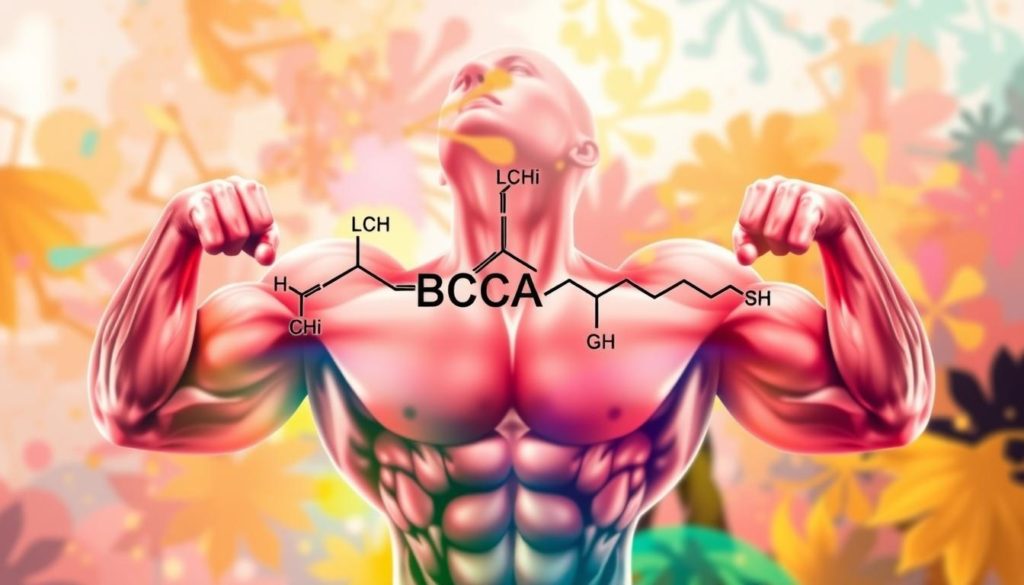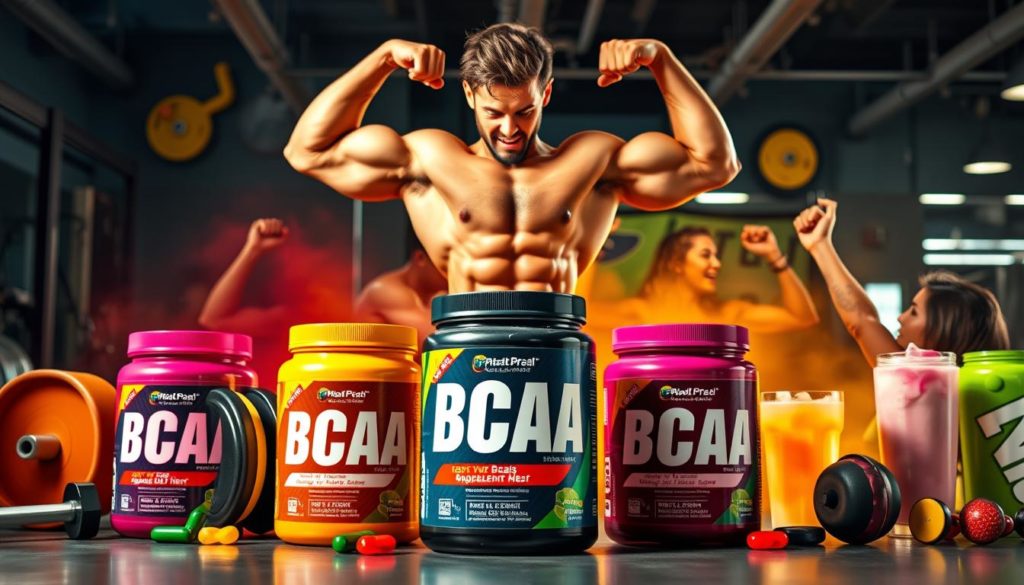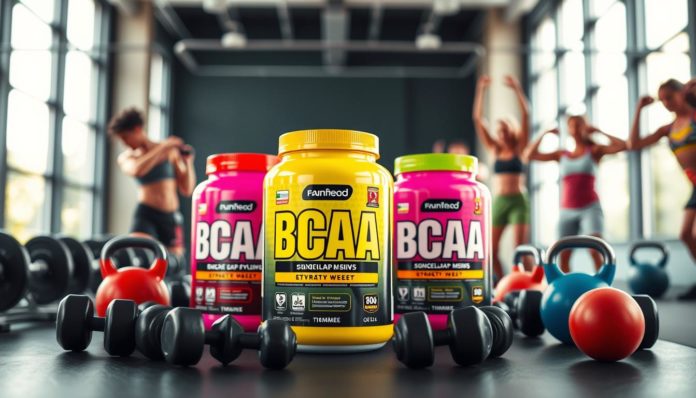For those who love fitness and sports, growing muscles and recovering quickly is key. BCAAs, or Branched Chain Amino Acids, are essential amino acids that help a lot. They support muscle growth and help with recovery, making them popular in the fitness world.
BCAAs are special because they go straight to the muscles. They help with protein making and fixing muscles. This is why BCAAs are great for building muscles and recovering from workouts. Adding BCAAs to your routine could be the change you need to reach your health goals.
Understanding BCAA and Their Role in the Body
Branched chain amino acids (BCAAs) are more than just simple ingredients in your protein shake. They play key roles in muscle recovery and metabolic function. Let’s explore their structure and function in the human body.
What Are Branched Chain Amino Acids?
BCAAs include three essential amino acids: leucine, isoleucine, and valine. They are called ‘branched-chain’ because of their unique structure. The body can’t make them on its own, so we need to get them from food or supplements.
Found mainly in protein-rich foods, BCAAs are vital for keeping muscle mass and supporting protein synthesis.
The Science Behind BCAAs and Protein Synthesis
BCAAs are key building blocks for proteins and boost protein synthesis. Leucine, in particular, helps a lot with muscle growth and repair. BCAAs help the body build proteins faster and reduce protein breakdown during hard exercise.
This supports muscle recovery.
BCAAs: More Than Just Building Blocks
BCAAs do more than just build muscles. They help with glucose uptake in tissues and glucose synthesis during long exercise. This keeps energy levels up and aids in recovery after workouts.

BCAAs also help control blood sugar levels by increasing sugar uptake in liver and muscle cells. So, getting the right amount of BCAAs can improve physical performance and muscle recovery. This shows their big impact beyond just protein synthesis.
BCAA (Branched Chain Amino Acids) and Muscle Building
In the world of fitness supplements, Branched Chain Amino Acids (BCAAs) are key for muscle growth. They include leucine, isoleucine, and valine. These essential amino acids help build lean muscle and boost muscle protein synthesis.

Research shows BCAAs are great for muscle growth. Leucine, in particular, starts the mTOR pathway. This is vital for building muscle by starting protein synthesis.
BCAAs also stop muscle breakdown. This helps muscles grow fast and stay healthy. It’s why they’re loved by bodybuilders and fitness fans.
| Amino Acid | Role in Muscle Growth | Benefits in Fitness Regimens |
|---|---|---|
| Leucine | Activates mTOR pathway for protein synthesis | Significantly enhances muscle size and strength |
| Isoleucine | Supports glucose uptake into cells | Improves energy and sustains muscle endurance |
| Valine | Plays a role in stress response and muscle metabolism | Helps with muscle repair and recovery post-workout |
Adding BCAAs to your workout routine can make your exercises more effective. It leads to more muscle growth and better fitness results. So, they’re a must-have in the fitness supplements world for top performance and muscle gain.
The Connection Between BCAA and Muscle Recovery
Branched-Chain Amino Acids (BCAAs) play a key role in muscle recovery after exercise. They help muscles repair faster and get ready for the next workout. This is very important for athletes and fitness lovers.
Reducing Muscle Soreness Post-Workout
BCAAs greatly reduce muscle soreness after hard workouts. This is true for both new and experienced exercisers. The amino acids leucine, isoleucine, and valine work together to lessen muscle damage.
This makes muscles feel less sore. It also lets people train more regularly. Regular training is key for growing stronger muscles.
Accelerating Repair and Regrowth of Muscle Fibers
BCAAs also help muscles repair and grow back faster. This is very helpful after workouts because muscles get strained and tiny tears happen. BCAAs boost protein making in muscles.
This helps muscles heal quicker. So, BCAAs are a must for athletes and fitness fans who want fast recovery. They are a key part of workout supplements.
Adding BCAAs to your diet, through supplements or food, is good for muscle health. It makes them a key part of sports nutrition.
Optimal Dosage of BCAAs for Muscle Gains
Knowing the right amount of BCAAs is key to growing muscles and reaching your fitness goals. It’s important to know how much and when to take them for the best results. Here’s a guide to help you use BCAAs effectively.
Deciphering the Right Amount for Your Fitness Goals
The amount of BCAAs you need depends on your fitness goals, body weight, and how hard you work out. For muscle growth, take about 10-20 grams a day, spread out in several doses. Here’s a simple guide:
- For light to moderate activity: 10 grams daily
- For high-intensity workouts or bodybuilding: 15-20 grams daily
Following these guidelines can boost protein making and muscle repair. This helps you reach your fitness goals faster.
Timing Your Intake for Maximized Results
When you take BCAAs matters a lot for muscle recovery and growth. Here’s a suggested schedule:
- Pre-Workout: Take 5-10 grams about 30 minutes before working out. It helps prevent early muscle tiredness and improves performance.
- Intra-Workout: Take 5-10 grams during your workout. It keeps energy up and stops muscle damage in long workouts.
- Post-Workout: A similar dose after working out helps with quick recovery. It reduces muscle soreness and speeds up repair.
Using BCAAs at these times can greatly improve your workout results. It makes it easier to grow muscles and reach your fitness goals. Start with lower doses to see how your body reacts.
Using the right amount of BCAAs at the right times boosts your fitness goals and athletic performance. BCAAs are a great addition to your diet.
BCAAs and Fitness: A Duo for Peak Performance
Adding BCAA to your fitness routine offers many benefits. It helps athletes and fitness lovers stay at their best. BCAA is key for muscle recovery and boosts fitness performance during workouts.
BCAA, or branched-chain amino acids, are vital for energy during tough workouts. They are a must for athletes in long sports or hard activities. This is because energy runs low fast.
- Enhancing energy production to reduce fatigue
- Improving mental focus during workouts
- Supporting faster recovery times between training sessions
Thinking of BCAA as a workout supplement is more than just building muscles. It’s about keeping your fitness performance high during workouts. This makes BCAAs a top choice for those wanting to reach their limits and perform at their best.
BCAAs are also great during calorie-deficit times, like in cutting phases. They help keep muscle mass while keeping strength and endurance up. This is key for athletes wanting to improve without losing muscle.
BCAAs ensure sustained energy supply by facilitating glucose uptake into muscles and liver, providing a continued energy flow during prolonged training sessions.
Adding BCAA to your diet shows its vital role in boosting athletic performance. It’s a key part of workout supplements for both hobbyists and pros. Clearly, BCAAs are not just supplements; they’re essential for a winning fitness plan.
The Comparative Advantages of BCAA Supplements Over Whole Protein
BCAA supplements have clear benefits over whole protein for muscle growth and recovery. They offer better digestion, absorption, and muscle support. This makes BCAAs a top choice for athletes and fitness lovers.
Ease of Digestion and Absorption
BCAAs stand out because they are easy to digest and quickly absorbed. Unlike whole protein, BCAAs don’t need to be broken down first. They go straight to the bloodstream, giving muscles the nutrients they need fast.
This is key after a workout when muscles are most hungry for nutrients. It helps kickstart the recovery process.
BCAAs: Targeted Muscle Growth Support
BCAA supplements also focus on muscle growth. They boost protein synthesis in muscles better than whole protein. This focus helps muscles recover and grow faster.
| Feature | BCAA Supplements | Whole Protein |
|---|---|---|
| Absorption Speed | Fast | Slow |
| Primary Benefit | Targeted muscle recovery and growth | General bodily functions including tissue repair and enzymes production |
| Usage Convenience | High (no digestion required) | Low (digestion needed) |
In summary, BCAA supplements focus on muscle recovery and growth. They ensure nutrients are used where needed most. This gives them an edge over whole proteins.
How BCAAs Complement Your Diet and Lifestyle
BCAAs are a key supplement for health and fitness, important for vegans and vegetarians. They help fill nutritional gaps in plant-based diets. This ensures you get enough amino acids, often missing in vegetarian diets.
Filling the Nutritional Gaps
Diets low in animal products often lack essential amino acids. These acids are vital for protein synthesis and muscle repair. Adding BCAAs to your routine helps fill these gaps. It supports a healthier body for fitness and daily life.
BCAAs for Those on Vegan or Vegetarian Diets
BCAAs are very helpful for vegans and vegetarians. Plant-based diets are rich in nutrients but often lack certain amino acids found in animal products. BCAAs provide these essential nutrients, aiding in muscle recovery, growth, and overall health.
- Enhanced muscle synthesis
- Better energy and endurance
- Improved recovery times
- Reduced muscle fatigue
BCAAs help overcome dietary challenges of plant-based eating. They not only support but also improve a vegetarian or vegan lifestyle. This makes it easier to reach nutritional and fitness goals.
BCAAs as Workout Supplements: What You Need to Know
BCAAs (Branched Chain Amino Acids) are key in fitness. They help repair and grow muscles. This makes them a favorite among athletes for better performance and quicker recovery.
Adding BCAAs to your workout routine can change your game. But, it’s important to know how they work and when to use them. Let’s dive into their benefits and what to keep in mind.
- Enhanced Muscle Recovery: BCAAs are great for fixing and growing muscle after exercise.
- Reduction in Muscle Fatigue: They help fight fatigue during long workouts by reducing serotonin in the brain.
- Increased Protein Synthesis: BCAAs boost muscle growth and repair by increasing protein synthesis.
BCAAs are flexible and can be taken at different times for best results. But, it’s important to watch out for any health risks. People with certain metabolic issues should talk to a doctor before using BCAAs.
Getting the most out of BCAAs means matching them with your fitness goals and diet. It’s all about balance.
“BCAAs are a powerful tool for improving performance and recovery. But, they should be part of a healthy diet and fitness plan.”
Looking to improve muscle recovery, reduce fatigue, or grow muscle faster? BCAAs can help take your fitness to the next level.
Discovering the Best BCAA Products for Your Regimen
Finding the right BCAA products for your fitness routine is key. It’s not just about the brand or price. What matters most is the quality and what’s in the formula.
Criteria for High-Quality BCAA Supplements
High-quality BCAA supplements are pure and well-formulated. Look for products from trusted manufacturers. They follow strict production standards.
Check for third-party testing, clear labels, and no extra fillers. These ensure you get the best for your diet.
Reading Labels: BCAA Ratios and Other Ingredients
Knowing BCAA ratios and ingredients is important. Good BCAA products usually have a 2:1:1 ratio of leucine, isoleucine, and valine. This helps with muscle growth and recovery.
But, some people might prefer different ratios. It depends on their fitness goals.
Also, look at the label for other ingredients. Avoid high sugar and choose products with electrolytes. Electrolytes help keep you hydrated during tough workouts.
| Ingredient | Benefit | Consideration |
|---|---|---|
| Leucine | Enhances protein synthesis | Main driver in the BCAA combo |
| Isoleucine | Increases energy levels | Supports muscle repair |
| Valine | Stimulates muscle growth | Helps in muscle metabolism |
| Electrolytes | Maintains hydration | Important for long workouts |
| Zero sugars | Healthier option | Avoids unnecessary calories |
Choosing the right BCAA products is about more than just the brand. Look at the quality, ratios, and ingredients. This will help you get the best results from your workouts.
Tailoring BCAA Intake to Different Types of Exercise
Adjusting BCAA intake for your workout type can greatly improve your performance and recovery. Whether you’re into endurance or strength training, knowing how to adjust BCAA levels can make a big difference.
BCAAs for Endurance vs. Strength Training
Endurance athletes, like marathon runners and cyclists, need a steady supply of BCAAs. This helps them perform longer and delay getting tired. They should take BCAAs throughout the day, before, during, and after their workouts.
On the other hand, strength trainers, like weightlifters, need more BCAAs right before and after their workouts. This helps their muscles recover and grow faster, which is key after intense workouts.
Modifying BCAA Use Based on Workout Intensity
The intensity of your workout affects how fast your body uses BCAAs. Lower intensity workouts don’t use BCAAs as quickly as high-intensity ones. For intense workouts like HIIT or heavy lifting, more BCAAs can support your muscles and help you recover faster.
Changing your BCAA intake based on workout intensity helps meet your nutritional needs. It also optimizes your performance and recovery. Finding the right balance is key to getting the best results and keeping your muscles working well.
To get the most out of BCAAs, tailor your intake to your workout type and intensity. This personalized approach ensures your muscles get the right fuel for any challenge. It adapts to your body’s needs perfectly.
Key Considerations Before Starting BCAAs
Before adding BCAAs to your fitness routine, check your health and diet first. If you have health issues or take medicine, talk to a doctor. They can tell you if BCAAs are safe for you. Remember, BCAAs work differently for everyone, so they need to fit your health and goals.
Understanding your diet is important before starting BCAAs. Do you get enough protein? Do you want to build muscle or recover faster? Look at your diet and workouts to see if BCAAs can help. They might give your body the extra boost you need.
Don’t expect BCAAs to change your body overnight. They should help, not replace, a good diet and workout plan. Starting BCAAs with unrealistic hopes can be disappointing. See them as a long-term way to improve your fitness and health.
FAQ
What Are Branched Chain Amino Acids?
Branched Chain Amino Acids (BCAAs) are three essential amino acids: leucine, isoleucine, and valine. They are called “branched chain” because of their structure. BCAAs are key for muscle growth and repair.
How do BCAAs facilitate muscle recovery?
BCAAs reduce muscle soreness and help muscles repair after exercise. They do this by lowering muscle damage and boosting protein synthesis.
Can BCAAs improve my athletic performance?
Yes, BCAAs can boost your athletic performance. They help produce energy and reduce fatigue. This lets athletes train harder and longer.
What is the optimal dosage of BCAAs for muscle growth?
The best dosage of BCAAs varies by fitness goals and body type. Dosages range from 5 to 20 grams daily. Choose a dosage that fits your training and nutrition needs.
When should I take BCAAs for the best results?
Timing your BCAA intake is key. Taking BCAAs before, during, or after workouts supports muscle growth and recovery. Each timing has its benefits.
Are BCAA supplements better than whole protein sources?
BCAA supplements aren’t always better than whole proteins. But they’re quicker to absorb, making them great for muscle growth support, mainly around workout times.
How can BCAAs support a plant-based diet?
BCAAs can help vegans and vegetarians meet essential amino acid needs. This is because they might not get enough from plant-based proteins.
What should I look for when choosing a BCAA product?
Look for high-quality ingredients and a 2:1:1 ratio of leucine to isoleucine and valine. Also, check for third-party testing and minimal additives.
Should I adjust my BCAA intake based on the type of exercise I do?
Yes, adjust your BCAA intake based on your exercise type. Endurance training might need steady BCAA release, while strength training might require a larger dose for recovery.
What are the key considerations before starting BCAAs?
Before starting BCAAs, consider your health, any medical conditions, diet, and workout regime. Getting advice from a healthcare professional can be helpful.


